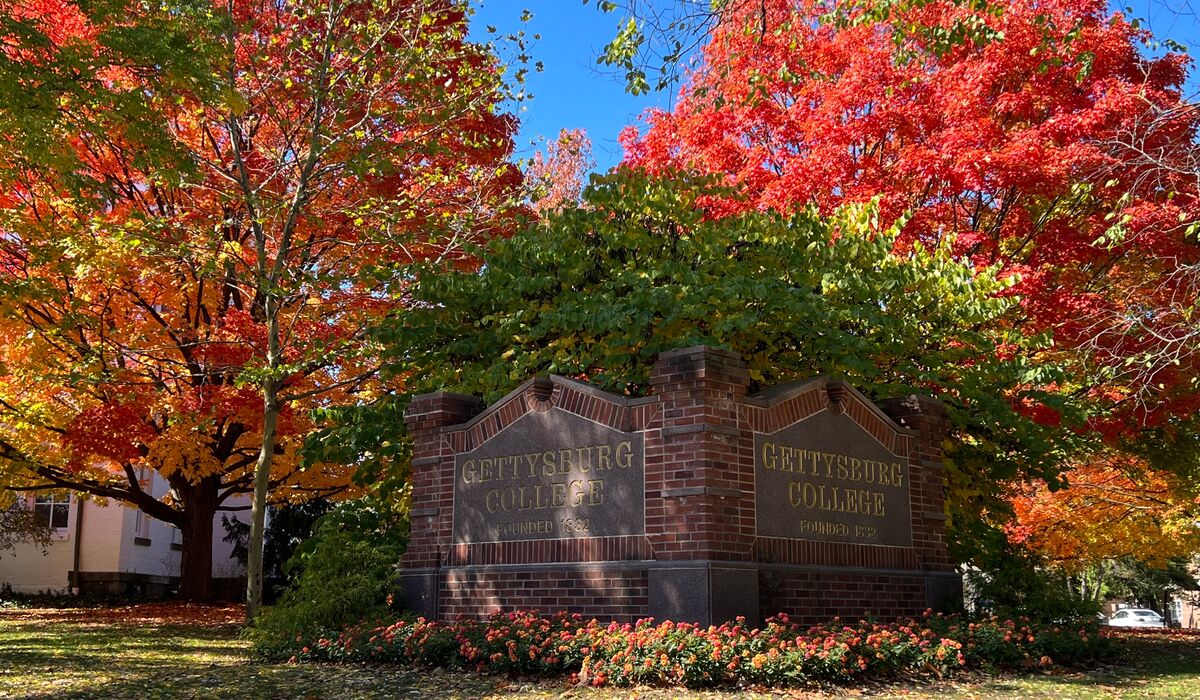
As teachers, scholars, and artists, Gettysburg College professors facilitate energy and engagement with new thinking and discovery in their respective fields, which is contagious for our students.
Gettysburg College’s distinctive liberal arts and sciences education can be attributed greatly to our first-class faculty, who inspire our students each day with their passion and expertise. No matter the area of study, our faculty members are eager to help our students unlock their potential through A Consequential Education, providing them with the knowledge and enduring skills to succeed.
During the 2024-2025 academic year, Gettysburg College recognized six faculty who were granted tenure and the rank of associate professor and five faculty who were granted the rank of full professor. Read below to learn about these professors and their impact at the College.
Rank of Associate Professor
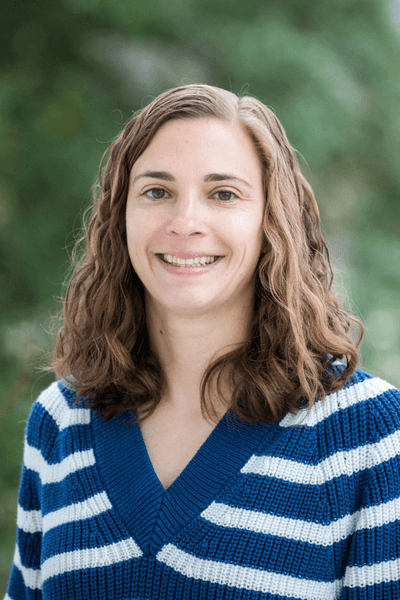
Health Sciences Prof. Megan Benka-Coker
Health Sciences Prof. Megan Benka-Coker ’09 has devoted her career to researching the health impacts of household air pollution and addressing the gaps in policies related to energy poverty. A graduate of Gettysburg College with a Bachelor of Arts in health sciences and globalization studies, Benka-Coker earned her Master of Public Health from Emory University and Ph.D. from Colorado State University.
From her doctoral research focusing on household air pollution in Ethiopia and Honduras to the lessons taught in public health, global health, and epidemiology at the College, Benka-Coker instills her own passions in the classroom when examining her field of study all over the world.
“The opportunity to teach and mentor students at my alma mater is an incredible joy,” said Benka-Coker, remembering her own undergraduate experience at the College and reflecting on her career path. “My experiences from my time as a student at Gettysburg College shaped my passion for global health work and research, and it is exciting to guide current students through their own academic and professional journeys.”
Benka-Coker is hopeful that her teaching will inspire students to gain a broader understanding of global health and its importance.
“I hope that courses I teach on public health, epidemiology, and global health give students a new perspective on health—one that moves away from thinking health is solely an individual responsibility to one that is shaped by our environment, social and economic structures, and policies,” she said. “The field of public health is an applied discipline, and my hope is that students are able to utilize what they learn in the classroom to current and future experiences.”
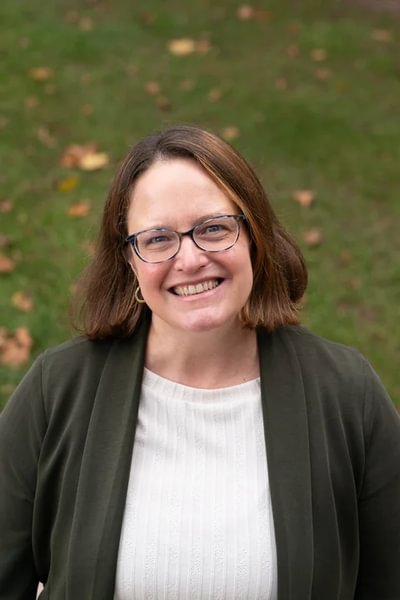
Economics Prof. Meg Blume-Kohout
Economics Prof. Meg Blume-Kohout combines her interests in many disciplines, from economics to sociology to computer science, to approach economics in an innovative way. Her creative pedagogy sparks an inquisitive outlook on the field that allows her students to explore their passions. From her introductory economics courses to “Just” Data? in the College’s data science program, Blume-Kohout explores the effects of economic incentives and public policies in society and the economy.
With a Ph.D. in policy analysis from Pardee RAND Graduate School, Blume-Kohout has researched numerous topics, particularly how the government influences entrepreneurship, scientific innovation, higher education, and participation in the STEM workforce. Blume-Kohout looks forward to seeing her students find new ways to appreciate economics through the variety of classes she teaches at the College.
“My goal is to spark students’ appreciation for economics and quantitative analysis as ways of understanding the world,” said Blume-Kohout. “We, Gettysburg faculty, are accomplished in our fields but chose to be here because we’re passionate about working closely with our students and equipping them with skills and tools they can take into their future careers.”
Blume-Kohout enjoys the variety of different classes she teaches, the students she works with each day, and her other roles across campus. She also serves as the faculty liaison to the women’s soccer team and is the First-Year Data & Society coordinator for the new curriculum, which is effective with the class entering Fall 2025.
“I especially enjoy teaching the ‘bookends’ of the curriculum: introductory microeconomics and advanced econometrics,” she said. “Introductory courses give me the opportunity to show students that economic analysis and ways of thinking are applicable to the things they care about, not just business or finance. In my advanced econometrics course, I mentor students to become competent, articulate, and ethical analysts. They learn to critically evaluate research, design their own projects, and clearly present results. Working one-on-one with each student on their individual research projects is time-consuming, but very rewarding.”
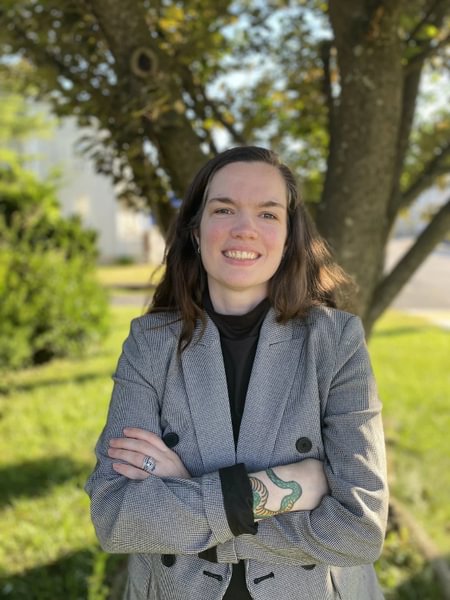
Management Prof. Alice Brawley-Newlin
Management Prof. Alice Brawley Newlin brings a wide range of expertise to the Management Department at Gettysburg College, focusing on industrial-organizational psychology in her doctoral program at Clemson University, from which she graduated in 2016. She primarily teaches methods classes for statistics and research, as well as Workplace Motivation, a course exploring the practicality and logistics of motivation in real world workplace motivations through the lens of psychology theories.
Since joining the Gettysburg faculty, Brawley-Newlin has enjoyed being able to connect with her students on a more personal level with smaller class sizes. She is also an advocate for the open access movement, an initiative to ensure course materials and textbooks are freely available to students through which she tailors her course materials to match her students’ interests.
“Whether it’s understanding their career goals or chatting about their family pets, these close working relationships help me guide students to relevant opportunities and resources,” Brawley-Newlin said.
“Some of my favorite experiences are the ‘lightbulb’ moments, where a student sees how the class material is directly relevant to their life, even beyond their academic experience,” she said. “Here, students get to explore all kinds of topics they’re passionate about. It’s an honor to help students develop expertise in areas that excite them, or simply dive into a subject for fun.”
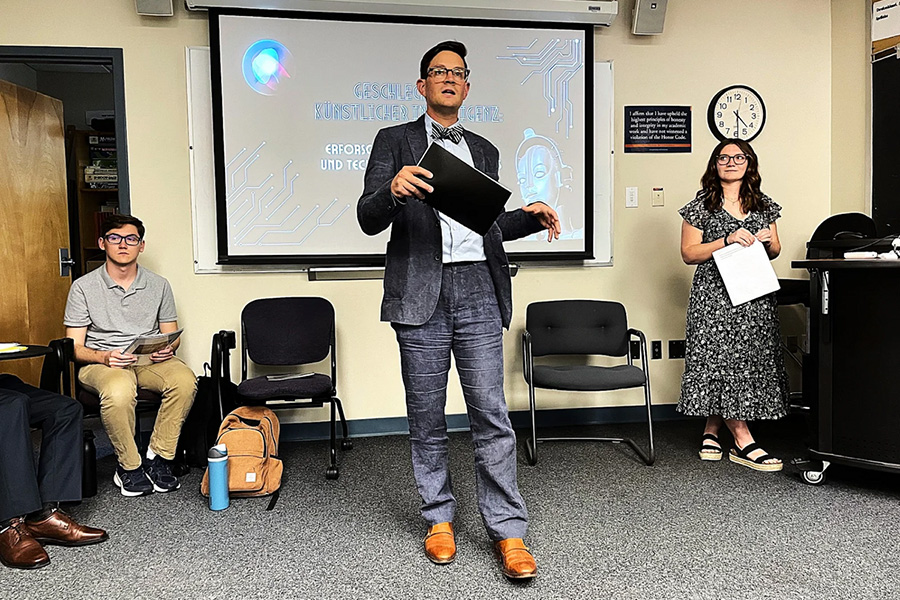
German Studies Prof. Tres Lambert
German Studies Prof. Tres Lambert is an active member in the German Studies Department, with research and teaching interests in a variety of areas of study from Austrian literature to Modernism. A Ph.D. graduate of the Carolina-Duke graduate program in German studies in 2017, Lambert has discovered his passions through research and publishing many works, which are featured in his courses.
Lambert teaches core German classes; German culture classes centered around science, society, and film; and a First-Year Seminar class entitled Puppies! A Study of Dogs in Literature and Film, which connects students across the College. The variety in Lambert’s classes allows for interesting discussions and rewarding opportunities each day.
“I really appreciate the open, curious attitude and adventurous spirit that students bring to our classes,” said Lambert. “It gives me great confidence as an instructor to know that I can assign just about anything—from difficult theories to children’s literature to weird avant-garde films and experimental novels—and students will enthusiastically tackle the challenge.”
Lambert also remarked on how he enjoys seeing where a humanities education can take his student, even to a professional level of teaching in Germany and Austria on Fulbright and USTA grants. “When students land these prestigious opportunities, it affirms that the College is succeeding in its aim to create global citizens, and it validates my work in German Studies by underscoring the critical advantage that a degree in foreign language can provide.”
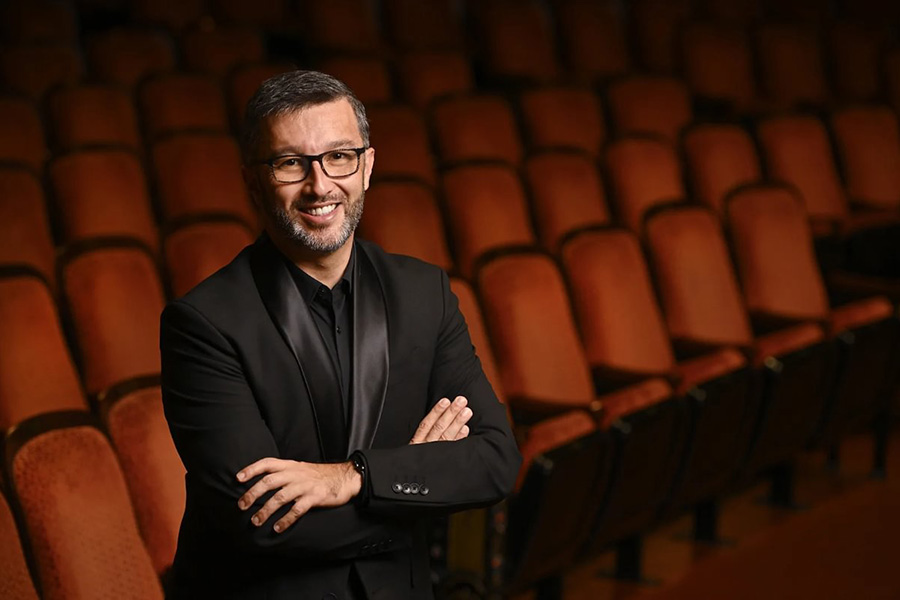
Sunderman Conservatory of Music Prof. César Leal
Sunderman Conservatory of Music Prof. César Leal brings a wide range of knowledge to Gettysburg College through his roles as both director of orchestral activities and a professor of musicology. He has conducted orchestras around the world while promoting interdisciplinary work through masterclasses and directing opportunities.
Shifting his focus toward musicology with his Ph.D. from the University of Kentucky, Leal incorporates his passion for music into classes that focus on the history of music and its impact on a world stage over time. He has published many scholarly papers and works for the project Repertoire Explorer series, writing introductory essays for new editions of musical scores. Whether on a podium conducting or explaining a concept to a musicology class, Leal enjoys working with his students every day.
“Teaching at Gettysburg College is immensely rewarding, as it allows me to engage with students intellectually and artistically in meaningful ways,” said Leal. “One of the highlights is designing and teaching musicology courses and seminars that address current topics. I am able to bring discussions of critical issues into the classroom, sparking thoughtful dialogue with students.”
While conducting, Leal helps students from all over the College foster their love of music, whether a music performance major or a student not studying music who wants to be involved.
“Watching them mature both as artists and thinkers is incredibly fulfilling and reinforces the collaborative, vibrant learning environment we foster together,” said Leal. “It’s a privilege to work alongside Gettysburg students as they explore, create, and deepen their understanding of music in a liberal arts context.”
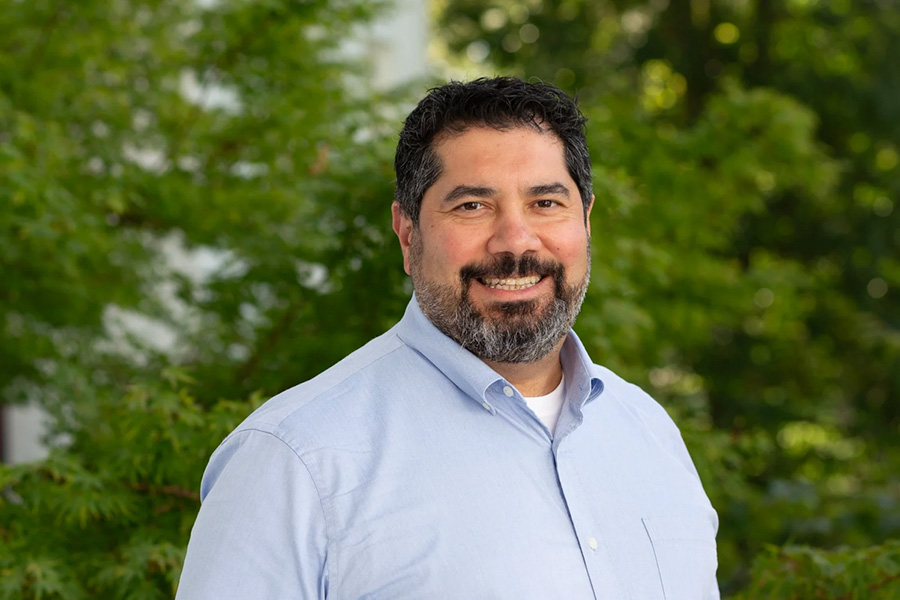
Economics Prof. Gokcer Ozgur
Economics Prof. Gokcer Ozgur teaches many subjects relating to economics, from Principles of Macroeconomics to economics history classes studying development over time, helping students fully understand the scope and importance of our contemporary economy. Ozgur earned his Bachelor of Science in economics at the Middle East Technical University in Ankara, Turkey, and his Ph.D. at the University of Utah in Salt Lake City, Utah. Prior to arriving at Gettysburg, he held several teaching positions in both Turkey and the United States.
Ozgur’s research specializes in non-traditional banking and how it impacts the stability of macroeconomics. He also has written several publications investigating various economic topics from monetary theory to income inequality, translating his expertise in the field to greater world issues.
“I remember being impressed with the students who attended my presentation and directed questions about my research, teaching philosophy, and pedagogy,” said Ozgur when reflecting on a past visit to the College. “Their depth and command of economic knowledge were outstanding.”
Since joining the College in August 2019, Ozgur has helped students achieve their goals in academics, leadership, and career opportunities.
“The enthusiasm, support, and intellectual diversity of my students and peers have made teaching economics a rewarding experience for me at Gettysburg College,” he said.
Rank of Full Professor
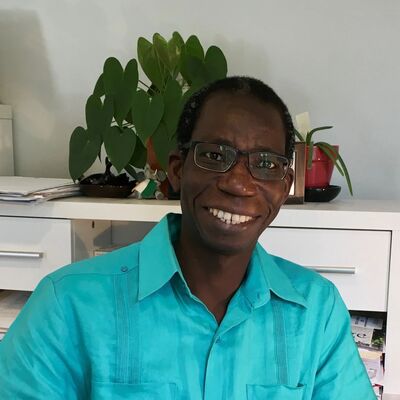
History and Africana Studies Prof. Abou Bamba
History and Africana Studies Prof. Abou Bamba has always had a fascination with foreign cultures since his early life, leading him to his areas of study being in English and Spanish at the Université d'Abidjan-Cocody in Ivory Coast. Bamba earned a Ph.D. in history from the Georgia State University in Atlanta, Georgia, in 2008, as well as a certificate in geographic information science.
Bamba specializes in colonialism, modernization, and African history, bringing his expertise into several classes in the History Department and the Africana Studies Program at the College. He is also a published historical investigator on many topics, from migration to the search for “the good life” in Africa and the Global South.
“Researching and teaching about Africa and the place of Africa in an ever-interconnected world has been a passion for me for a long time,” said Bamba. “One of the things I like about the College is its promotion of the teacher-scholar model. This certainly fosters opportunities to mentor students in incredible ways.”
Specifically, Bamba enjoys the opportunity to work one-on-one with students to help them complete independent research projects, where mentorship makes a big impact.
“I came away with the conviction that investing in the education of our students was worth the effort,” said Bamba, reflecting on past mentoring experiences.
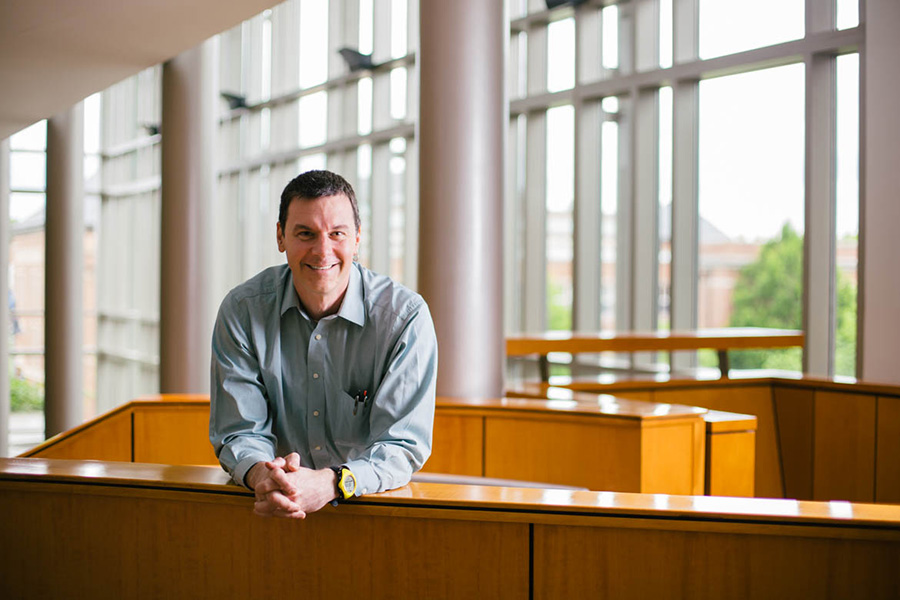
Biology Prof. Matthew Kittelberger
Biology Prof. Matthew Kittelberger is fascinated by the brain and aims to discover more about nerve circuits regulating social behavior through his own work studying vocal communication in toadfish. When teaching biology, Kittelberger uses his expertise in the neural circuits of these creatures to apply findings about brain, behavior and neurobiology to his classes at the College.
After earning his bachelor’s degree in biochemistry from Harvard University in 1990, Kittelberger shifted his focus to neurobiology, earning his Ph.D. from Duke University in 2002. Since then, he has published several papers in scholarly journals and continues to study toadfish.
Kittelberger teaches a variety of classes in the Biology Department and also supervises students’ independent research projects. His classroom teaching ranges from Introductory Biology to Cell Biology to Neurobiology, reaching students with many interests at the College.
“One of the things I most enjoy about teaching at Gettysburg is the wide diversity of students I work with,” said Kittelberger. “Gettysburg attracts science students from all sorts of backgrounds, who come from all over the world, and who are aiming for all sorts of post-graduation careers.”
Kittelberger enjoys helping students work together to achieve goals collectively as a class, building enduring skills for professional careers after graduating.
“Each student brings unique perspectives, unique interests, and unique goals, which makes for excellent discussions in the classroom and in the lab,” he said. “That means that students learn a huge amount from their interactions with each other.”
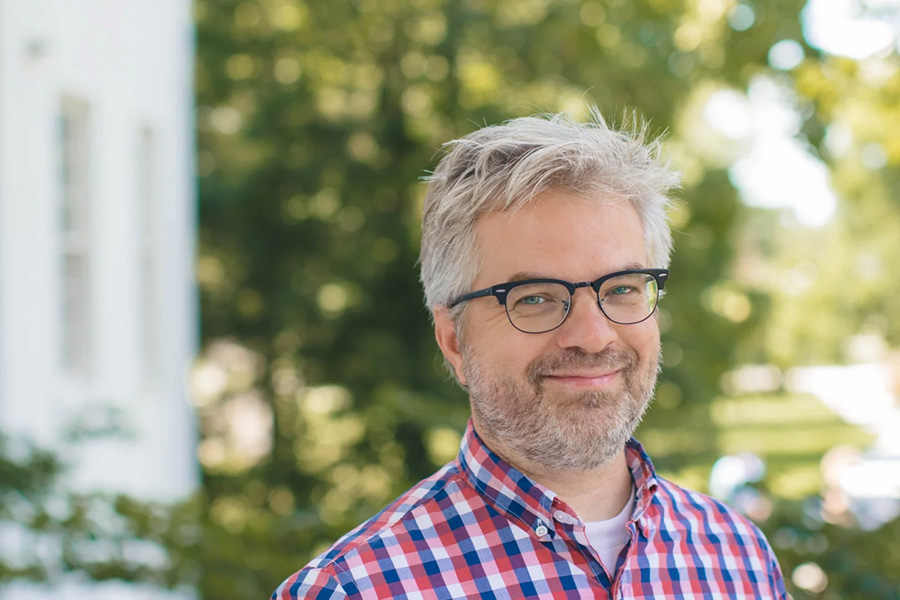
Public Policy Prof. David Powell
Public Policy Prof. David Powell experienced many opportunities in leadership before becoming the Interdisciplinary Studies chair at Gettysburg College in 2018-2019, a position that was very fulfilling. After majoring in history and English at the College of William & Mary, he relocated to Georgia to pursue graduate degrees in education at the University of Georgia, teach high school social studies, and even coach JV soccer. All the while, Powell has conducted a plethora of research about social studies pedagogy, which is published in many scholarly journals.
Powell found that his passion for history translated very well into higher education at Gettysburg College, where he teaches a variety of courses focusing on education policy, politics of education, history, and social studies. He is also the director of the First-Year Seminar program as of 2021, which provides a class of a niche interest to each first-year student’s fall semester schedule, helping them explore potential new academic interests.
Powell was chair of the Education Department from 2014-2017 and again from 2019-2020, gaining new experiences from each time serving this role and the many others he has held during his time at Gettysburg.
“My work has changed a lot in my 16 years on the faculty, but the one thing that remains constant is the steady stream of thoughtful and engaged students I get to teach. I’ll never get tired of that,” he said.
“It’s an old (very old) cliche that, if you do what you love, you’ll never work a day in your life,” Powell continued. “Being a professor here at Gettysburg College is truly the fulfillment of a lifelong dream.”
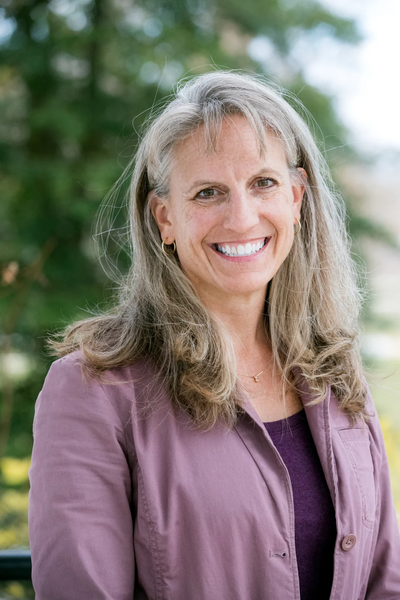
Sociology and Educational Studies Prof. Divonna Stebick
Sociology & Educational Studies Prof. Divonna Stebick believes in creating a way to support all learners by teaching in a manner that allows for intellectual growth beyond theory. Research opportunities in Stebick’s courses in educational studies are inquisitive and community-based, even if teaching is not your desired career path. Stebick provides opportunities for students to bridge the gap between theory and practice.
Over the past decade, Stebick has published several scholarly articles in educational journals, focusing on open-access journals so that her research is accessible to all. She has brought her expertise in the nuances of education to her many courses at Gettysburg, from Young Adult Literature and Media to Introduction to Educational Studies, as well as a student favorite: Creativity, Teaching, and Learning Across the Disciplines.
When reflecting on her experience as a professor at Gettysburg, Stebick said, “I appreciate the opportunity to help students navigate complex ideas and develop critical thinking skills that extend beyond the classroom.”
“My approach to teaching emphasizes authenticity, reflection, and practical application, using the philosophical approach of ungrading, which aligns with the liberal arts mission of the College,” she continued. “Whether in education courses or through the Innovation and Creativity Lab, I strive to create a collaborative learning environment.”
Each day, Gettysburg College students equally make an impact on Stebick.
“I am inspired by their enthusiasm and creativity, and I find that this energy fuels my own passion for teaching and learning,” she said.
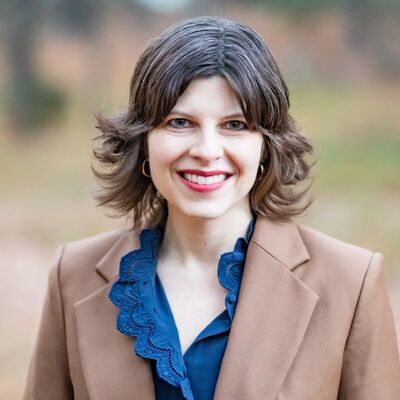
German Studies Prof. Kerry Wallach
German Studies Prof. Kerry Wallach teaches courses on the overarching topics of German-Jewish history and culture, antisemitism, and the Holocaust at the College. She incorporates her expertise into each class from German language to The Holocaust Through Film. Since earning her Ph.D. from the University of Pennsylvania in 2011, Wallach has been able to contribute her scholarly research to many notable articles and books. She also sits on the editorial board of the German Jewish Cultures book series published by Indiana University Press.
Wallach’s courses cover an array of interests through the lens of German-Jewish culture, including gender, sexuality, literature, history, film, art, and visual culture. She is an affiliate of the Jewish Studies Program, but also works closely with the Women, Gender, and Sexuality Studies and Cinema and Media Studies Departments. Wallach enjoys providing an education in a variety of subjects. Her First-Year Seminar is called What’s in a Name? Cultural Naming Trends.
“What I love about teaching at Gettysburg is that I get to teach a wide range of courses in German studies and Jewish studies to students who are excited to explore important topics in the Humanities,” she said. “I really enjoy helping students engage with and critically analyze visual texts and I also aim to help students become better writers.”
Wallach hopes that students’ experiences in her classes will bring about an inspiration to inspire change, in whatever way possible, after graduation.
“Every student should leave my classes with a deeper understanding of cultural diversity and at least a modest commitment to bringing about change in the world,” Wallach said.
Related Links:
By Ainsley Green ’27
Photos by Delaney Rabenold ’24 and courtesy of featured faculty
Posted: 12/19/24